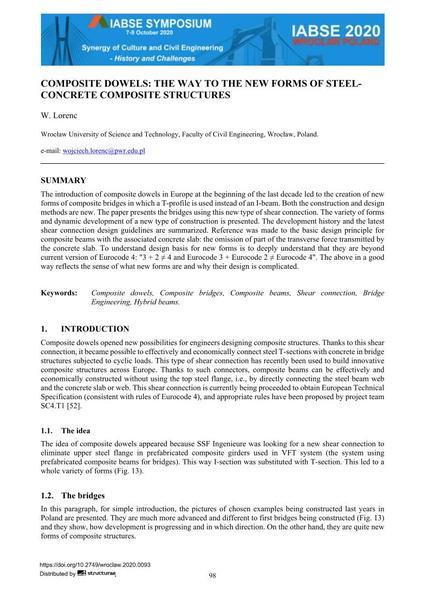Composite Dowels: the Way to the new Forms of Steel-Concrete Composite Structures

|
|
|||||||||||
Bibliographic Details
| Author(s): |
W. Lorenc
(Wrocław University of Science and Technology, Faculty of Civil Engineering, Wrocław, Poland)
|
||||
|---|---|---|---|---|---|
| Medium: | conference paper | ||||
| Language(s): | English | ||||
| Conference: | IABSE Symposium: Synergy of Culture and Civil Engineering – History and Challenges, Wrocław, Poland, 7-9 October 2020 | ||||
| Published in: | IABSE Symposium Wroclaw 2020 | ||||
|
|||||
| Page(s): | 98-138 | ||||
| Total no. of pages: | 41 | ||||
| Year: | 2020 | ||||
| DOI: | 10.2749/wroclaw.2020.0093 | ||||
| Abstract: |
The introduction of composite dowels in Europe at the beginning of the last decade led to the creation of new forms of composite bridges in which a T-profile is used instead of an I-beam. Both the construction and design methods are new. The paper presents the bridges using this new type of shear connection. The variety of forms and dynamic development of a new type of construction is presented. The development history and the latest shear connection design guidelines are summarized. Reference was made to the basic design principle for composite beams with the associated concrete slab: the omission of part of the transverse force transmitted by the concrete slab. To understand design basis for new forms is to deeply understand that they are beyond current version of Eurocode 4: "3 + 2 ≠ 4 and Eurocode 3 + Eurocode 2 ≠ Eurocode 4". The above in a good way reflects the sense of what new forms are and why their design is complicated. |
||||
| Keywords: |
composite bridges composite beams composite dowels shear connection bridge engineering Hybrid beams
|
||||
